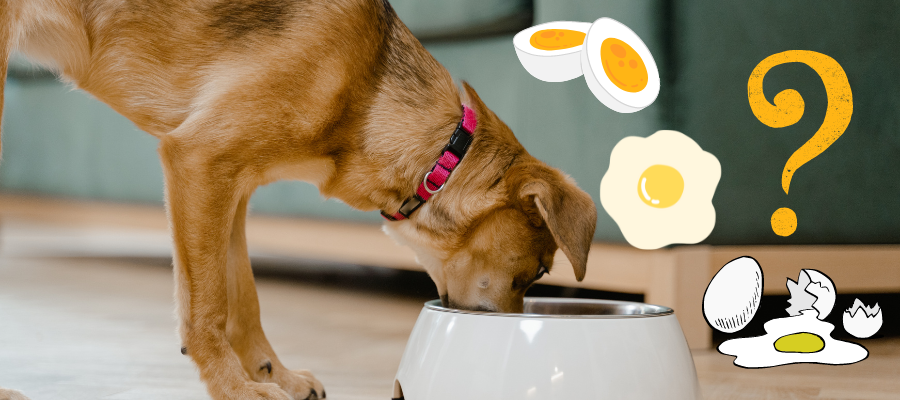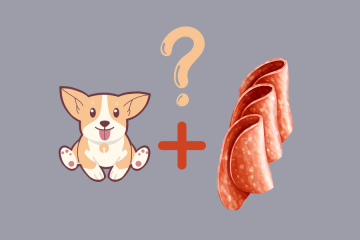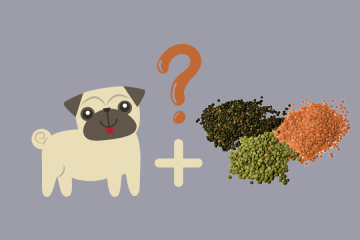Eggs seem like an egg-cellent addition to our dogs’ diets. But like with any other type of food, there must be some risks involved. So, can dogs eat eggs? Today, you will learn that:
Key Takeaways
- it is indeed safe for dogs to eat eggs ✔️
- eggs are a good source of protein, amino acids and choline ✔️
- eggs should always be fully cooked for dogs ✔️
- too many eggs can cause stomach problems ✔️
Can Dogs Eat Eggs?
So, can dogs eat eggs? Yes, most dogs can eat them with no problem! Eggs offer all sorts of health benefits for dogs, including protein and healthy fats. Just make sure that you cook them thoroughly so as not to risk any nutritional deficiencies or bacterial infections in your pet!
You should always choose eggs that come from Animal Welfare Approved sources. And if you’re still hesitant, don’t let us egg you on: ask a vet to help you make a decision based on your dog’s individual needs.
The Benefits of Eggs for Dogs

Eggs are nature’s powerhouse – packed with essential vitamins and minerals to help promote growth. But when it comes to your pup, should you be adding eggs into their diet? Here are some health benefits of eggs for dogs:
- Eggs are a good source of protein for dogs.
- Packed with essential amino acids, plus generous doses of selenium and B vitamins – eggs are an ideal food for Fido! Not only do they provide the building blocks his body needs to stay strong and healthy, but their nutrient profile also helps support thyroid function and cell renewal.
- Eggs are also a good source of choline, which is important for cognitive development and healthy fetal growth, so you may want to consider feeding them to your dog during her pregnancy.
- Egg yolks contain lutein and zeaxanthin, which are two antioxidants that are beneficial for your dog’s eyesight.
The Risks of Feeding Dogs Eggs
Can dogs eat eggs? If you’re wondering what’s in an egg that could be harmful to your pup, here’s what you need to know about the risks of giving eggs to your furry friend.
- Some dogs are allergic to eggs. If you notice any signs of an allergic reaction after feeding eggs to your dog, such as excessive scratching, vomiting, or diarrhea, stop giving them immediately and consult with a veterinarian.
- Many eggs, particularly raw eggs, are often infected with salmonella. This bacteria that can cause nausea, vomiting, and diarrhea in humans and dogs alike. While the risk of your dog contracting salmonella from eggs is low, it is still something to be aware of.
- Raw egg whites and yolks contain avidin, which can interfere with your dog’s ability to absorb biotin (vitamin B) from other foods. Feeding too many raw eggs over time could lead to a deficiency in this important vitamin! Biotin deficiency usually leads to skin problems and hair loss.
- Raw egg whites contain trypsin inhibitors that interfere with your dog’s ability to digest protein.
- Eggs have a high fat content and are fatty foods. That means that they should be fed in moderation to avoid gastrointestinal problems like pancreatitis or diarrhea. Overfeeding any type of food could lead to obesity later down the road, though!
How to Serve Eggs to Dogs

- Cooked eggs are safe for dogs, but remember that they can become rancid over time, so don’t leave them out in the open air too long before serving! If you’re going to feed your pup an egg, make sure it’s fresh and refrigerated at all times.
- Egg whites should always be cooked before feeding them to dogs. They contain trypsin inhibitors that interfere with your dog’s ability to digest protein; also remember not give too many raw eggs over time due to their potential impact on biotin absorption (see above).
- Egg yolks should always be cooked before feeding them to dogs because they contain avidin, which can interfere with your dog’s ability to absorb biotin (vitamin B) from other foods.
- If you want to add some flavor or nutrients, try mixing eggs with vegetables like spinach – just make sure they’re cooked first.
- Hard-boiled eggs are a healthy treat for your dog that you can mash them up and mix into their dog food.
Here’s how to boil eggs for your dog:
- Place the egg in a small pot and fill with enough water to cover it completely.
- Bring the water to a gentle boil over medium heat
- Reduce the heat to low and simmer for about ten minutes until cooked through (the white will be firm but not hard when you press it lightly). You can also use an egg poacher if you prefer.
You can also serve your dog fried eggs by heating up some oil in the pan and fry the eggs until they’re golden brown on both sides before adding other ingredients such as meats (if desired). Make sure the eggs cool down before serving.
How Many Eggs Can Your Dog Have?
A good rule of thumb is no more than one egg per day, depending on the size of your dog. If you’re going to give your dog more than one egg, make sure to mix it up with other healthy foods as well. We don’t recommend feeding your dog too many eggs (more than 3 a day).
Can Dogs Eat Scrambled Eggs?
Scrambled eggs are a tasty, nutritious treat for your pup! However, you’ll need to be aware of how they’re prepared – cooking them all the way through is essential in order to avoid any health risks.
Add lean proteins like chicken and turkey bacon when serving scrambled eggs as an occasional snack; however stay clear of ingredients such as onions, mushrooms or garlic which may harm your four-legged friend. Take care not to overindulge since these snacks have high fat content that won’t make it into regular meals for Fido.
Sarah Jameson is a journalist, reporter and a pet nutritionist. She is married to Peter, and they have two beautiful children, Zoey and Quinn. In her spare time, Sarah enjoys cooking for her family and playing snooker. She also loves spending time with her Scottish Terrier, Bobby.












